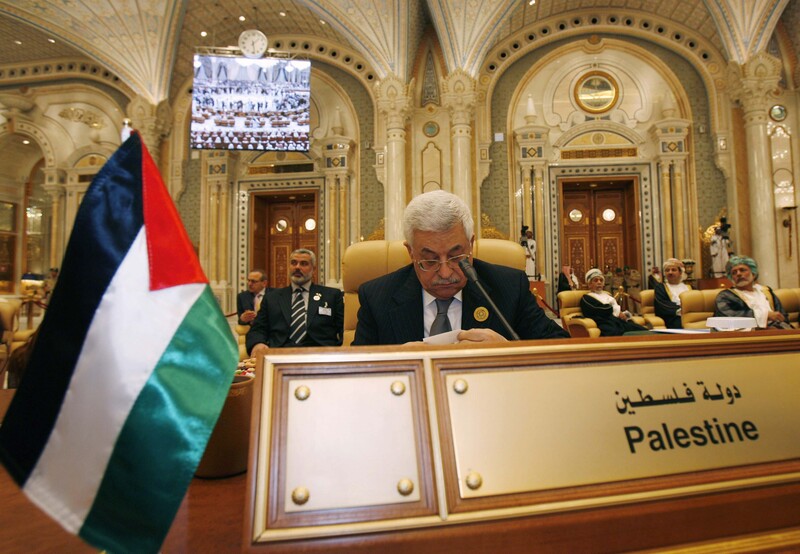Power Suits 11 September 2020

Just the two of us: Fatah’s Mahmoud Abbas and, behind, Hamas’ Ismail Haniyeh. Palestinian diplomacy is floundering after Arab states refused to condemn the UAE’s accord with Israel.
ReutersThe Arab League meeting on Wednesday left Palestinians dismayed, underscored the toothlessness of the region’s main political body and illustrated a growing sense of Palestinain diplomatic drift.
The videoconference of Arab foreign ministers was not the only diplomatic setback for Palestinians in recent days. News that Serbia intends to move its embassy – still also Kosovo’s embassy – to Jerusalem may largely be an attempt to curry US favor (as was the UAE-Israel accord). But it shows how little regard the Palestinian cause is beginning to be held in around the world.
Wednesday’s meeting suggests that it is not just further afield, but even in the Arab region that the Palestinian cause is gradually being put out to pasture. As so often before, the region’s foreign ministers parlayed with little practical end result on anything.
On Palestine, Saudi Arabia repeated its support for a two-state solution as laid out in the Arab Peace Initiative of 2002, a pretty much permanent fixture of these events.
But the Palestinian leadership in the West Bank was looking for something that suggested this initiative was more than just words. Ramallah had pushed for a resolution condemning the recently signed UAE-Israel accord.
Undermining the premise
After all, the 2002 Saudi diplomatic gambit was delivered on the fundamental premise of land for peace.
And the plan was a substantial carrot for Israel. Under it, Israel would keep 78 percent of historic Palestine and share a divided Jerusalem, with no obligation to millions of Palestinian refugees. In return, all members of the Arab League would sign peace treaties and normalize relations with Israel.
(The fact that Israel refused this deal is as sure a sign as any that it never intended to agree to a two-state solution with Palestinians, or at least not one that wasn’t obviously a cruel joke.)
The UAE-Israel accord undermines the very essence of the Saudi peace initiative. By going its own way, effectively giving Israel the goods without charging a price, accepting no land for normalization, Abu Dhabi has destroyed the proposal.
And it has done more than snub Riyadh. It has, as Israeli Prime Minister Benjamin Netanyahu pointed out, undermined the very premise of land for peace. This is the foundation upon which Palestinian diplomacy has been based since 1988, when the Palestine Liberation Organization formally pivoted to a two-state solution.
Instead, Netanyahu boasted, the new formula is “peace for peace.” Which is all good and well when you’re an oil-rich principality far away.
It’s a less useful formula when you are being occupied by the very country promoting this approach.
Setting precedent
The UAE deal has done more. It has set precedent. Other countries, in the Arab region and beyond, can now follow suit citing Abu Dhabi’s example.
Some will do so of their own accord.
Others will be cajoled. US aid, for instance, can now come with an Israel-normalization string attached that countries will find it hard to argue against. Before, perhaps, countries like Sudan could argue successfully that any attempt at forcing it to normalize relations with Israel would incur too high a regional reputational cost.
Now, the UAE has broken consensus. The US can twist arms more easily.
For these reasons and more, the Palestinian leadership in the West Bank was looking for more than a reassertion of the principles of the Saudi initiative. Palestinians were looking for clear condemnation of the UAE accord.
None came. And it is a huge defeat for Palestinian diplomacy. Palestinian Authority foreign minister Riyad al-Maliki tried to find a positive, saying that at least there was no statement of “Arab backing for normalizing ties with Israel.”
But he’s grasping at straws, and he knows it. The Arab League meeting was, in the words of one Palestinian official speaking off record due to the sensitivity of inter-Arab relations, a “serious hit.”
Without the pillar of Arab consensus, Palestinian diplomacy is floundering. Decades of effort have gone to waste.





Comments
Treachery
Permalink Abe Hayeem replied on
This is only a culmination and rubber-stamping of the backdoor collusion of the major Arab states with Israel as a bastion of imperialism and a partner of the US as the arms suppliers to give the oil-rich Gulf states hegemony against Iran. If they were serious about support for justice in Palestine they would never have allowed Israel to get so far in swallowing up nearly all of the land that was needed for a so-called state, which itself, even with the 2002 Saudi plan, would not have been an acceptable solution, knowing Israel's expansion its agenda.
The UAE's move will open the flood gates for not only the Arab states, but other nationalist states to rush to normalise, in fact, partner with Israel, as with Modi's India, and copy Israel's colonizing tactics and war crimes.
So it is all the more important for international solidarity with Palestine, and never more urgent to push for BDS in every field possible.
Perhaps after normalising the Arab states have pressure points?
Permalink So what if? replied on
Okay, yeah. This seems pretty grim. However, what if after this normalising of Arab states and Israeli rel'ships the Arab states have leverage and diplomatic pressure they can put on Israel? If now they can withdraw that recognition and use the new links to put diplomatic pressure and demand Israel does something more and better and doesn't just ignore the Palestinians human rights and case here? Is that too naive a hope? Could there be some things an Arab world that officially recognises Israel can do that an Arab world that doesn't couldn't? Just maybe?
(Serious question not rhetorical. Don't know, thinking aloud as it were here.)
Arab League’s failure to support Palestinians
Permalink Kathleen Grover replied on
I am saddened to see the Palestinian people lose the active support of the Arab League. I am in awe of the strength and courage of the Palestinians. Their ability to remain steadfast in the face of countless setbacks, persevering when they must feel abandoned by the world, is truly remarkable.
The international community has provided little or no support, mostly lip service, and has continually failed to hold Israel accountable for its violations of international law. The US has been the worst, blocking any attempts to sanction or hold Israel accountable by use of its veto in the UN Security Council. In addition the US has provided aid (nearly 50% of all foreign aid) and military equipment to Israel, turning a blind eye to its own State Dept rules on use of aid and weapons. I fear if Biden wins in November conditions will not improve. As an American I oppose the actions of the US government. I am ashamed of my government’s treatment of the Palestinian people and their complete failure to bring any justice to the Palestinians. There can be no peace without justice.
BDS is the only realistic weapon to force change: people power
Permalink Pat Mc Ginley replied on
Ruling elites in the UAE etc., are easily bought by the corporate-controlled US Empire because they only care about increasing their own power and wealth. The vast majority of people worldwide despise injustice and would support BDS if they knew the facts about the brutal Israeli apartheid regime. Greatly increased support for the worldwide BDS movement is the only way ordinary people can bypass their US-puppet governments, rulers etc. The more these puppets denounce BDS, the more ordinary people will become aware of BDS and the necessity for it. People power! The most powerful force of all. BDS!